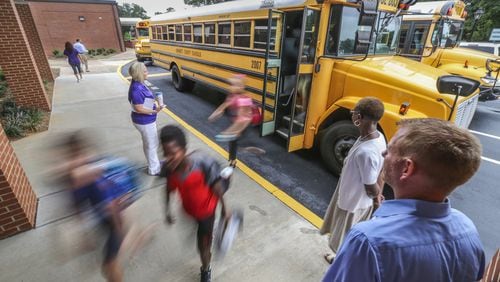Gwinnett County public school leaders, who opened the doors for a new school year Monday, are increasingly turning to technology to improve classroom performance.
Georgia’s largest school district is one of a handful nationwide using “predictive analytics” to determine where its 180,000 students need the most help. Gwinnett’s partner in this effort is IBM, which joined forces with the district several years ago.
The data was initially used to spot things such as whether a student is excessively absent. Now, they want the data to help them do more to assist in finding classroom techniques to help students struggling academically and help those doing well to excel.
“We still need to try to get the predictive analytics working at that level,” Gwinnett Superintendent J. Alvin Wilbanks said in an interview.
Some parents and observers, though, are worried about what kind of data schools are keeping about children as well as some learning exercises using IBM-related technology.
"A corporate, data-collecting platform that exposes very young children to the harm of increased screen time and to fairly blatant marketing, and that encourages problematic behaviors, should not be imposed unless parents are given complete information about the program and allowed to remove their children from participating," said Jane Robbins, an attorney and a senior fellow with the American Principles Project, a conservative-leaning organization, who's been critical of some of Gwinnett's practices.
Wilbanks said Gwinnett has tried to be careful collecting data, adding the school district has been working on efforts to make its passwords more secure.
“We only need to be collecting the data we need to collect,” he said.
Because of its size and finances, Gwinnett is known to be eager to try new technology or ideas in the classroom. Gwinnett's $2 billion budget is twice as large as Cobb's, Georgia's second-largest public school district.
In 2013, Gwinnett and IBM announced their data partnership as part of the school district’s eClass initiative to use technology to improve classroom performance. Teachers and principals use data from student assessments, frequently comparing the results to other Gwinnett schools, to determine what teaching techniques can be used to improve student performance. Gwinnett officials believe it’s helping, in some cases with the help of characters like Elmo.
A few months ago, IBM and the Sesame Network announced they had created the industry's first vocabulary learning app for kindergarten students. The app featured Sesame Street characters alongside IBM's Watson artificial intelligence learning technology, educational videos and word games.
The pilot focused on words most kindergarten students, or adults, don’t use, such as “arachnid.” Some teachers noticed students during recess referring to spiders on the playground as arachnids and noting the camouflage, another word taught to the students, on bugs’ bodies.
At Coleman Middle, Georgia’s only state-certified school for science, technology, engineering, the arts and math, teachers and students were already preparing Monday to work on their first large-scale projects of the year using different forms of technology. Some students, for example, will collect county restaurant food-inspection data to look for trends in bacteria or diseases. Other students will use 3D printers or computers in the music lab for various projects.
Principal J.W. Mozley said he finds students are not “bashful” about using some gadgets in the school. The key, he said, is to keep them trying different forms of technology.
“We feel very strongly that students should be producers of the technology, not just consumers,” Mozley said.
In other Gwinnett news:







